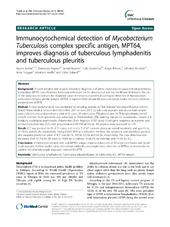| dc.contributor.author | Tadele, Agerie | en_US |
| dc.contributor.author | Beyene, Demissew Balcha | en_US |
| dc.contributor.author | Hussein, Jemal | en_US |
| dc.contributor.author | Gemechu, Tuffa | en_US |
| dc.contributor.author | Birhanu, Asaye | en_US |
| dc.contributor.author | Mustafa, Tehmina | en_US |
| dc.contributor.author | Tsegaye, Aster | en_US |
| dc.contributor.author | Aseffa, Abraham | en_US |
| dc.contributor.author | Sviland, Lisbet | en_US |
| dc.date.accessioned | 2015-01-07T14:01:13Z | |
| dc.date.available | 2015-01-07T14:01:13Z | |
| dc.date.issued | 2014-11-25 | eng |
| dc.identifier.issn | 1471-2334 | |
| dc.identifier.uri | https://hdl.handle.net/1956/9090 | |
| dc.description.abstract | Background: A rapid, sensitive and accurate laboratory diagnosis is of prime importance in suspected extrapulmonary tuberculosis (EPTB) cases. However, traditional techniques for the detection of acid-fast bacilli have limitations. The aim of the study was to evaluate the diagnostic value of immunocytochemical staining for detection of Mycobacterium tuberculosis complex specific antigen, MPT64, in aspirates from pleural effusions and lymph nodes, the most common presentations of EPTB. Method: A cross-sectional study was conducted by including patients at Tikur Anbessa Specialized Hospital and the United Vision Medical Services from December 2011 to June 2012. Lymph node aspirates and pleural fluid samples were collected and analyzed from a total of 51 cases (26 tuberculous (TB) pleuritis and 25 TB lymphadenitis) and 67 non-TB controls. Each specimen was subjected to Ziehl-Neelsen (ZN) staining, culture on Lowenstein– Jensen (LJ) medium, cytological examination, Polymerase Chain Reaction (PCR) using IS1081gene sequence as a primer and immunocytochemistry (ICC) with polyclonal anti-MPT64 antibody. All patients were screened for HIV. Result: ICC was positive in 38 of 51 cases and in the 7 of 67 controls giving an overall sensitivity and specificity of 74.5% and 89.5%, respectively. Using IS1081-PCR as a reference method, the sensitivity and specificity, positive and negative predictive value of ICC was 88.1%, 89.5%, 82.2% and 93.2%, respectively. The case detection rate increased from 13.7% by ZN stain to 19.6% by LJ culture, to 66.7% by cytology and 74.5% by ICC. Conclusion: Immunocytochemistry with anti-MPT64 antigen improved detection of TB in pleural effusion and lymph node aspirates. Further studies using monoclonal antibodies on samples from other sites of EPTB is recommended to validate this relatively simple diagnostic method for EPTB. | en_US |
| dc.language.iso | eng | eng |
| dc.publisher | BioMed Central | eng |
| dc.rights | Attribution CC BY | eng |
| dc.rights.uri | http://creativecommons.org/licenses/by/4.0 | eng |
| dc.subject | Tuberculous lymphadenitis | eng |
| dc.subject | Tuberculous pleural effusion | eng |
| dc.subject | M. tuberculosis | eng |
| dc.subject | ICC | eng |
| dc.subject | MPT64 antigen | eng |
| dc.title | Immunocytochemical detection of Mycobacterium Tuberculosis complex specific antigen, MPT64, improves diagnosis of tuberculous lymphadenitis and tuberculous pleuritis | en_US |
| dc.type | Peer reviewed | |
| dc.type | Journal article | |
| dc.date.updated | 2014-12-11T20:41:15Z | |
| dc.description.version | publishedVersion | en_US |
| dc.rights.holder | Agerie Tadele et al.; licensee BioMed Central Ltd. | |
| dc.rights.holder | Copyright 2014 Tadele et al.; licensee BioMed Central Ltd | |
| dc.source.articlenumber | 585 | |
| dc.identifier.doi | https://doi.org/10.1186/s12879-014-0585-1 | |
| dc.identifier.cristin | 1232142 | |
| dc.source.journal | BMC Infectious Diseases | |
| dc.source.40 | 14 | |

